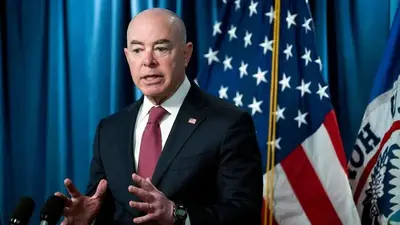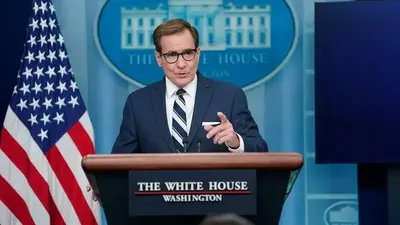Politics
Military family worries they can't afford child's lifesaving medications if government shuts down
For one military family, the consequences of a partial government shutdown would be dire: It could mean not affording treatments and medications for their child who is fighting for her life.
Austin Carrigg and her husband, Master Sgt. Joshua Carrigg, are parents of three -- their youngest, 11-year-old Melanie, has Down syndrome, a congenital heart defect and a metabolic disorder. Melanie recently had a catastrophic stroke.
Carrigg spoke with ABC News Senior Congressional Correspondent Rachel Scott and said her family pays around $300 out of pocket for medication each month. With the government on the brink of a shutdown as soon as Sunday, she said she's had sleepless nights worrying about how they'll be able to afford medications that Melanie needs.
MORE: As government shutdown approaches, agencies to tell workers that furloughs are coming

"That's been the conversation -- how will we be able to pay for the medications? Because they're not a choice," she said.
The Alexandria, Virginia, residents are one of many military families whose household budgets could take a hit in a government shutdown. As many as 4 million workers could lose pay as a result of a shutdown -- about half of whom are military troops and personnel.
Congress is just days away from triggering a shutdown. They have until the end of the day on Saturday to reach a deal on funding. If they don't, parts of the government will shut down and members of the military will likely have to work without a paycheck.

While the military would see back pay, that may not lessen the blow to many families living paycheck to paycheck.
Melanie sees a litany of specialists including ones for brain injury and spinal rehabilitation, four eye doctors and three urologists, Carrigg said. Concern about how they can give Melanie the care she needs has her family "stuck in this loop of worry and anxiety," Carrigg said.
"The question has really become, what can we get rid of? Who can we borrow money from in order to do what we need to do in order to keep her alive?"
Carrigg said her husband has been in active duty for 21 years, and this looming government shutdown feels like a slap in the face to the many military families who support the country yet live paycheck to paycheck.
"We're a pawn in a game," she said. "If they supported us, they would make sure we knew where our next meal was coming from."
MORE: Military families brace for loss of paycheck, services under a government shutdown
Now Carrigg is pleading with Congress to act.
"They are literally playing games with our lives. We mean nothing to them ... but they expect my husband to go fight their wars. That's not fair."
Scott asked Rep. Ralph Norman, R-S.C., what he would say to military families like the Carriggs.

"First of all, they do get a paycheck -- it's back pay," he said.
Other lawmakers have dismissed the impact of a shutdown.
"Most of what people will see is not a shutdown. What they will experience is the slowdown," Rep. Matt Rosendale, R-Mont., told Scott.

MORE: 'They don't care about us': Stories of people who would go without pay in government shutdown
Carrigg said she wants Congress to know there are "human lives on the line" and that her daughter is one of them.
"She's amazing. She's the bravest, strongest child you will ever meet," Carrigg said. "If she's willing to fight to stay alive … then, as the people who pay my husband to do his job, you have a responsibility to make sure her life is the best that it can be."
-

 Politics1h ago
Politics1h agoThe First Trans Member of Congress Expected Pushback Like Mace’s Bathroom Rule
-

 Politics1h ago
Politics1h agoNew York Prosecutors Oppose Dismissing Trump’s Hush Money Conviction
-

 Politics6h ago
Politics6h agoWhite House Christmas Tree Is a Symbol of Resilience for Hurricane-Hit North Carolina Farms
-

 Politics8h ago
Politics8h ago3 strategies to help Americans bridge the deepening partisan divide
-

 Politics22h ago
Politics22h agoHakeem Jeffries Wins Reelection as House Democratic Leader Despite Party’s Losses
-

 Politics1d ago
Politics1d agoHow Grover Cleveland’s Grandson Feels About Donald Trump Becoming the Second U.S. President to Serve Nonconsecutive Terms
-

 Politics1d ago
Politics1d agoAs Trump Seeks Mass Deportations, Workplace Raids May Not Help Much
-

 Politics1d ago
Politics1d agoOnce Again, Donald Trump Misreads the Senate



























